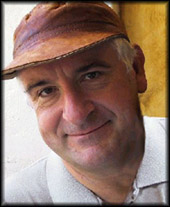<img src="files/dna/infopic.jpg” alt=”HHGG Game Cover” />
Author’s February 2005 Note:
Back in 1998, I turned my wider interest in archaeology to something more specific to my profession: software archaeology. A long session of clambering and excavation in my attic revealed my 1985 copy (on floppy disk, yet) of one of the most compelling and insane frustrating computer games of the time, The Hitchhiker’s Guide to the Galaxy. Under laboratory conditions, I then callously performed a dataectomy on it – extracting the game content from the enveloping application. The next step was to source Java interpreters that could run the extracted game data online, and on a variety of portable devices. The result is what first appeared on the TDV web site. I also ported it to the Palm and Newton, installing a copy on Douglas’s own Newton when he wasn’t looking – I’m not entirely sure if the subsequent exclamation was one of pleased surprise or historical pain.
I then, with permission from Activision, who’d taken over the code (but not script) rights when Infocom folded, used the game, in Java form, as part of the 1999 Comic Relief web site. Plans to release it formally as feeware on a variety of mobile platforms were put temporarily on hold when TDV was sold off, and things then lay quiet for several years. That was until 2004, when my erstwhile colleagues, Sean Sollé and Shimon Young, took the data file and, working with Rod Lord – the artist who created the graphics for the original BBC TV series – created a complete client-server implementation of the game, with a C++ application on the server and a very nice Flash-based browser interface. This has been released on the BBC’s web site, where it has been a huge success, resulting in an Interactive BAFTA award and the latest version, the Twentieth Anniversary Edition.
So if you want to play the game, I’d very strongly recommend you do so on the BBC’s web site, where you can make “Ooh” and “Aah” noises at the graphics and, usefully, save the game as well, something the original Java implementation couldn’t do. That I’ve included here, for historical reasons, along with the 1999-2001 introduction and help information I wrote (itself now being used by the BBC).

